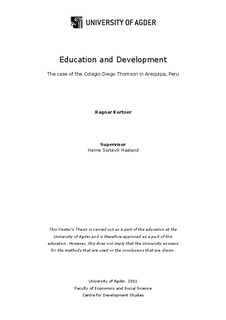| dc.description.abstract | This study explores the connection between management, education, and development. It is a case study focusing on the Colegio Diego Thomson (CDT), which is a school offering kindergarten, primary, and secondary education in the municipality of Alto Selva Alegre, a very poor district in the outskirts of Arequipa, Peru. The school is owned by the Evangelical Lutheran Church of Peru (IEL-P) and is operated in cooperation with the Peruvian state. Such a dual partnership may offer challenges to the parties involved, but might also generate synergetic effects towards quality education and development. The overall objective with the study was to find out if there is a connection between primary and secondary school management, quality education and development in Arequipa, Peru.
The study concludes that the school management‘s ability to make sound and decisive decisions has yielded positive results. Participating in a capacity building program has improved the teachers‘ pedagogical approaches thus leading to quality education and award winning student achievements. Hence cultural development is in progress. The strong achievements have led to increased self-esteem among the CDT students and teachers, and improved social status for the students‘ families, thus leading to social development. Given the growing Peruvian economy and the consistent research connecting education with higher income, even in Peru, the schools stakeholders seem equally optimistic that education will lead to economic development as well.
The study also concludes that the CDT management is better sustained and will gain more trust from the students if the management style becomes more democratic and inclusive, thus less dependent on the persons in management while encouraging dialogue. Furthermore, the findings reveal that the strong academic results achieved in the capacity building program are dependent on a motivated principal and teachers who are willing and able to learn and change. Moreover, the Lutheran identity of the school is a unifying element for both teachers and students and an important ingredient in the synergetic effects that take place in the school: The state observes that the CDT offers quality education and receives awards for it, and the IEL-P observes that it reaches an entire community with its message and values. | en_US |
